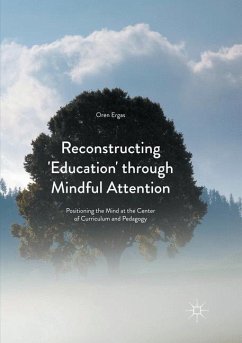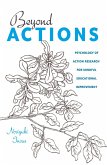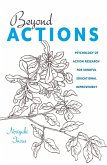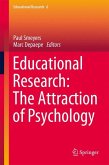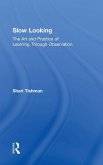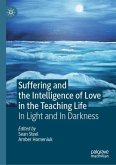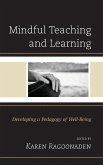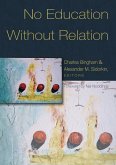This book reconstructs the idea and practice of education. Rather than conceiving of education as a process we undergo in which our minds are shaped by a social vision, Oren Ergas turns this notion of education on its head, arguing instead that we ourselves construct education. The multitude of problems with formal education and schooling, such as violence, inequality, and low achievements, are then seen as reflections of problems of the mind, meaning that close study of the mind is necessary if these problems are to be successfully tackled. Through philosophy, neuroscience and psychology, this book proposes a new perspective on 'educational' theory, practice and research. It will be of great interest to students and teachers, scholars of education, and educational policy-makers.
"This book is ground-breaking. It is surely essential reading for all of those who would engage with mindfulness and contemplative approaches in education and is as relevant for schools as it is for higher education. ... Ergas' profound and synthetic vision has the potential to not only connect us across educational, psychological, philosophical and contemplative divides, but also to open doors and break down our walls and silos." (Katherine Weare, Mindfulness, Vol. 11, 2020)
"This book is not just 'another' addition to the contemplative turn in education, which has been around since the turn of the millennium, but is an outstanding and unique contribution to this movement. ... the author does a really good job of analyzing the nuances of the mind ... . This book is not just about something, but rather, it is something." (Cuong Nguyen, Educational Philosophy and Theory, March, 2018)
"His examples are relevant and worthy of further thought because each can contribute todiscipline disparities and underperformance. Implied in these examples is the message that addressing problems of educational inequities and countering practices that do not serve diverse students must involve the inner curriculum, which is at play in constructing the perceptions and actions of those involved. Ergas' text provides the reader with a great deal to think about and act upon." (Shelley Thomas, Teachers College Record, April 04, 2018)
"What is most interesting in the book is that Ergas's writing models what he expresses. Rather than asserting his arguments in solely third-person statements, he speaks to the reader in a fresh, first-person language that includes experiential exercises. ... His book has made an important contribution to the field of contemplative education, and will no doubt lay the foundation for a more comprehensive development of what contemplative inquiry can contribute to a fuller and more enriching human life." (Judith Simmer-Brown, Buddhist Christian Studies, Vol. 38, 2018)
"This book is an important contribution to education and how mindful attention and inner curriculum are left behind or invisible. ... This text would be desirable for reading groups that engage the community, parents, and teachers in dialogue (and mindfulness activities) and in communal work to help students develop into active members of a democratic society." (Maureen P. Hall, Journal of Transformative Education, Vol. 16 (1), 2018)
"This book is not just 'another' addition to the contemplative turn in education, which has been around since the turn of the millennium, but is an outstanding and unique contribution to this movement. ... the author does a really good job of analyzing the nuances of the mind ... . This book is not just about something, but rather, it is something." (Cuong Nguyen, Educational Philosophy and Theory, March, 2018)
"His examples are relevant and worthy of further thought because each can contribute todiscipline disparities and underperformance. Implied in these examples is the message that addressing problems of educational inequities and countering practices that do not serve diverse students must involve the inner curriculum, which is at play in constructing the perceptions and actions of those involved. Ergas' text provides the reader with a great deal to think about and act upon." (Shelley Thomas, Teachers College Record, April 04, 2018)
"What is most interesting in the book is that Ergas's writing models what he expresses. Rather than asserting his arguments in solely third-person statements, he speaks to the reader in a fresh, first-person language that includes experiential exercises. ... His book has made an important contribution to the field of contemplative education, and will no doubt lay the foundation for a more comprehensive development of what contemplative inquiry can contribute to a fuller and more enriching human life." (Judith Simmer-Brown, Buddhist Christian Studies, Vol. 38, 2018)
"This book is an important contribution to education and how mindful attention and inner curriculum are left behind or invisible. ... This text would be desirable for reading groups that engage the community, parents, and teachers in dialogue (and mindfulness activities) and in communal work to help students develop into active members of a democratic society." (Maureen P. Hall, Journal of Transformative Education, Vol. 16 (1), 2018)

